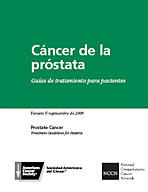June 21, 2007—Research in mice suggests that a diet high in omega-3 fatty acids found in fish oil and certain types of fish could potentially improve the prognosis of men who are genetically prone to develop prostate cancer.
"This study clearly shows that diet can tip the balance toward a good or a bad outcome," said senior researcher Yong Q. Chen, Ph.D., from Wake Forest University School of Medicine. "ItÂs possible that a change in diet could mean the difference between dying from the disease and surviving with it."
In mice that were engineered with a genetic defect that caused prostate cancer, a diet high in omega-3 fatty acids beginning at birth reduced tumor growth, slowed disease progression and increased survival. The research is reported online today by the Journal of Clinical Investigation and will appear in the July 2 print issue.
Prostate cancer is the most frequently diagnosed cancer and is a leading cause of death in men in the United States. Population studies have suggested that consumption of fish or fish oil reduces prostate cancer incidence. However, these investigations have been hampered by the difficulty people have in accurately reporting their dietary intake.
The goal of the current study was to explore gene-diet interactions in prostate cancer. It involved mice that were engineered with a genetic defect  they lacked a tumor suppressor gene and spontaneously developed prostate cancer. This gene (Pten) is absent in 60 to 70 percent of metastatic cancers in humans.
The engineered mice and "wild-type" (or non-engineered) mice were fed varying levels of omega-3 and omega-6 polyunsaturated fatty acids (PUFAs). Both are "essential" fatty acids, which means the body needs them for proper cell function but cannot produce them. Many vegetable oils contain omega-6 PUFA. Fish like salmon, herring, sardines, and albacore tuna are high in omega-3 fatty acids.
Nutritionists recommend that people consume equal proportions of omega-3 and omega-6 PUFA. However, in current western diets, the proportion of omega-6 to omega-3 is between 30 and 50 to one.
The mice were fed either
- a diet high in omega-3 (ratio of omega-6 to omega-3 was 1:1)
- a diet low in omega 3 (ratio omega-6 to omega-3 was 20:1),
- or a diet high in omega-6 (ratio of omega-6 to omega-3 was 40:1).
The scientists compared survival rates and weighed the animals prostates to measure tumor progression.
Mice with the tumor suppressor gene remained free of tumors and had 100 percent survival, regardless of diet. In mice with the gene defect, survival was 60 percent in animals on the high omega-3 diet, 10 percent in those on the low omega-3 diet and 0 percent in those on the high omega-6 diet.
"This suggests that if you have good genes, it may not matter too much what you eat," said Chen, a professor of cancer biology. "But if you have a gene that makes you susceptible to prostate cancer, your diet can tip the balance. Our data demonstrate the importance of gene-diet interactions, and that genetic cancer risk can be modified favorable by omega-3 PUFA."
Chen said dietary changes may be particularly beneficial in people prone to prostate cancer because the disease is usually diagnosed in older men and the tumors are slow-growing. ItÂs possible that eating a high omega-3 diet could delay tumor development or progression long enough for the man to live out his natural lifespan with prostate cancer.
"Our data imply a beneficial effect of omega-3 PUFA on delaying the onset of human prostate cancer," Chen said.
He noted that the mice got lifetime exposure of omega-3 and that some people may not be willing to change their diets until they develop cancer. He hopes to study whether there would be beneficial effects of adding omega-3 PUFA to the diet after tumors have developed.
He cautioned that the effects were obtained with the omega-3s found in fish oil and that omega-3s from flaxseed oil and other plants may not provide the same results.
Yong Q. Chen , Ph.D. is Professor of Cancer Biology and Director of the DNA Microarray Core at Wake Forest School of Medicine.
A reprint of of the article, Modulation of prostate cancer genetic risk by omega-3 and omega-6 fatty acids , Published June 21, 2007, in online at JCI in PDF, download free.
Co-researchers were Isabelle Berquin, Ph.D., lead author, and a team from Wake Forest, Southern Yangtze University in China, University of California Los Angeles School of Medicine, and Harvard Medical School. The research was funded by the National Institutes of Health.



